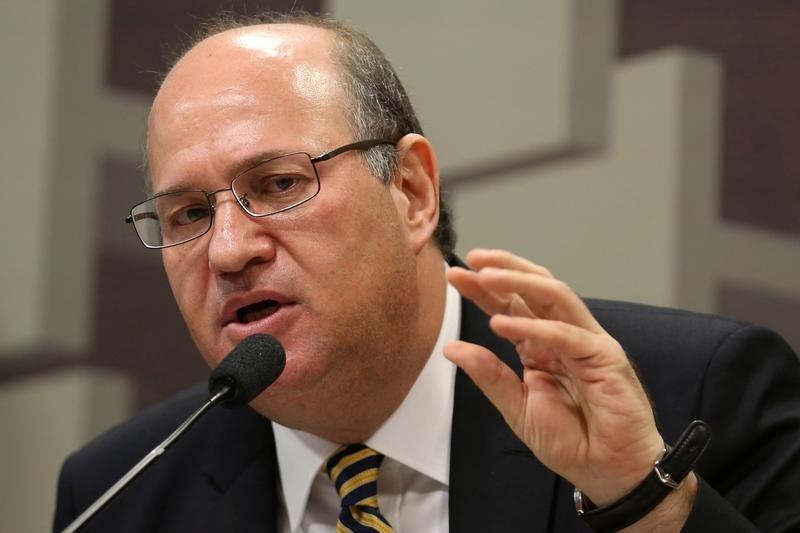By Alonso Soto and Marcela Ayres
BRASILIA (Reuters) - The prospect of turbulence in emerging markets due to U.S. rate rises could deter Brazil from quickly reducing its stock of currency swaps and should encourage the government to press ahead swiftly with economic reform, the central bank's governor said in an interview.
Ilan Goldfajn, a 50-year-old MIT-trained economist who has been on the job for three months, said the normalization of monetary conditions in the United States is imminent, even if the U.S. Federal Reserve does not raise interest rates next week.
The expectation of higher borrowing costs in the world's biggest economy will cause volatility in emerging markets, but provide motivation to adjust their economies during the current period of calm to better deal with an outflow of foreign capital in the future, he said.
"Emerging economies should take advantage of this benign environment to try to adjust their economies with the approval of reforms," said Goldfajn from the bank's futuristic, high-rise building that overlooks the capital Brasilia.
"It is window of opportunity that everyone should take advantage of, including Brazil."
President Michel Temer has vowed to push for a reduction in Brazil's generous pension benefits and a cap on public spending to recover investor confidence in the once-booming economy now mired in its worst recession in decades.
A split in the Federal Reserve board over whether to hike borrowing costs for the first time in nearly 10 months next week has rattled global markets, particularly Brazil's volatile real currency.
Goldfajn said a return of higher U.S. rates reduces the bank's scope to lower its traditional currency swaps, which function like dollar sales to investors but cost taxpayers dearly when the real declines.
The bank had used the derivatives to limit currency volatility but has reduced its stock of the costly instruments to around $36 billion from $108 billion at the start of the year.
"We always said that we will reduce the swaps' stock depending on (market) conditions and those conditions are changing now," said Goldfajn. "The market is under pressure as we see the normalization of U.S. monetary conditions advancing."
Uncertainties over U.S. monetary policy and Brazil's own fiscal prospects have dragged down the Brazilian real (BRBY) in recent weeks. However, the real remains the best-performing currency in Latin America, up around 20 percent in 2016.
The central bank on Wednesday reduced its sales of reverse swaps, which mimic the purchase of dollars in the futures market and reduce the bank's traditional swaps position. The bank slashed the amount of reverse swaps it sells on a daily basis to around $250 million worth of contracts from $500 million.
Goldfajn said the bank cannot rule out any currency intervention tools, even the use of international reserves, to reduce excess volatility in the future.
BALANCE OF CONDITIONS
Goldfajn, the former chief economist with the country's largest private bank Itau Unibanco (SA:ITUB4), has come under intense pressure from politicians and businessmen to cut interest rates, which are the highest among major world economies, to avoid hampering an incipient recovery.
Under his command the central bank has kept its benchmark Selic rate
Loosening policy will depend on a reduction in uncertainty over the planned fiscal reforms, a slowdown in inflation, and an easing in a food price shock caused by a prolonged drought, the bank said in the minutes of its last rate-setting meeting.
In the interview, Goldfajn said the balance of those three conditions would dictate future monetary policy, but no single factor would be more important.
When asked if all three factors had to improve to prompt rate action, Goldfajn said: "Not necessarily. I have to look at the combination of them to strike a balance."
"At this time, I cannot tell you the exact weight of each of these factors."
Recent data has shown the surge in food prices starting to ease and inflation expectations dropping, but analysts believe the government will have struggle to push austerity proposals through a restive Congress.
"What is most important for the central bank is whether we are putting the public accounts back in order," Goldfajn said. "As we improve this with time, capital flows will come in and investments will rise."
Goldfajn also said the bank will wait for "the best moment" to introduce draft legislation that would codify the bank's operational autonomy.
